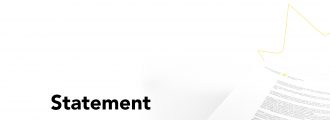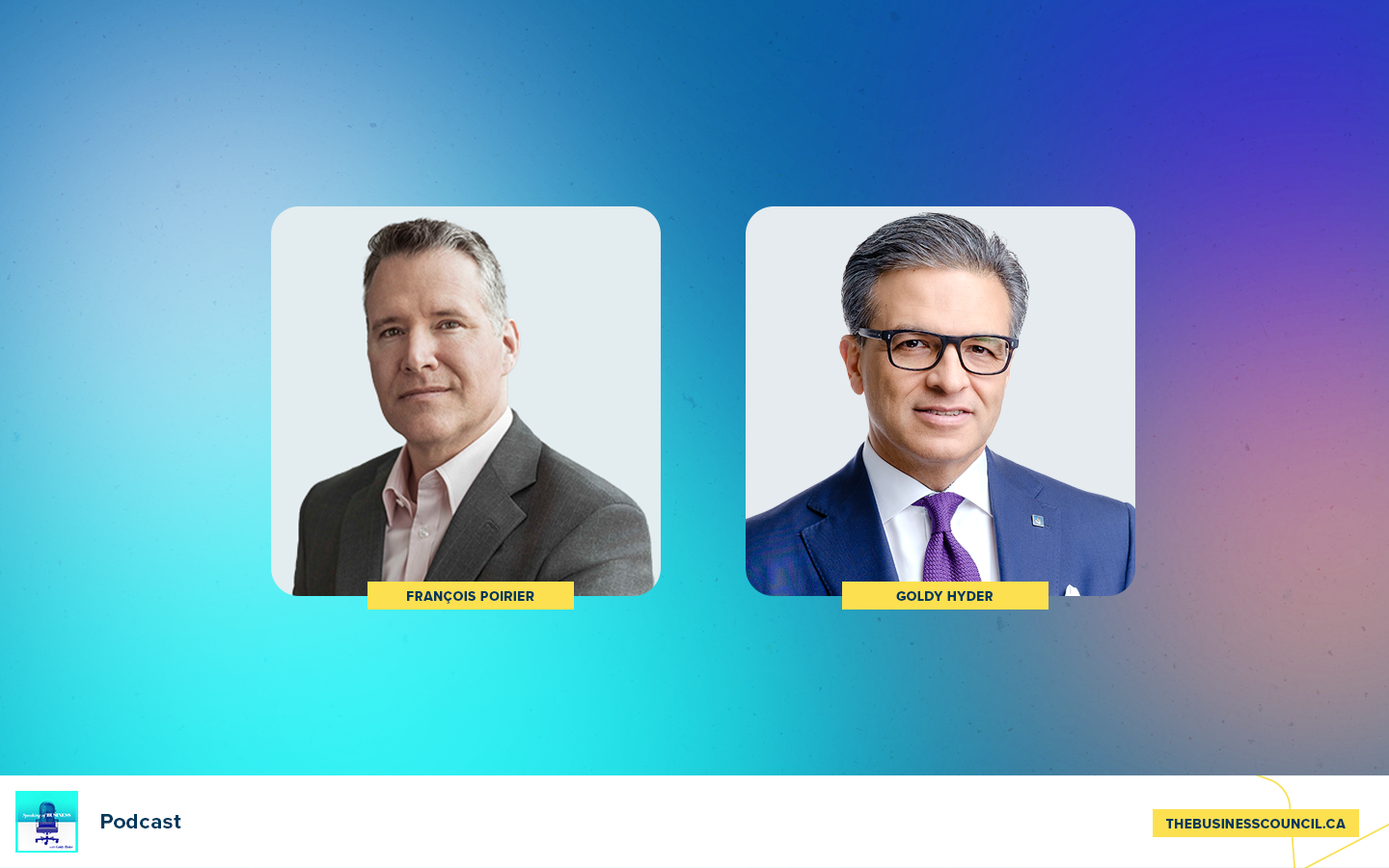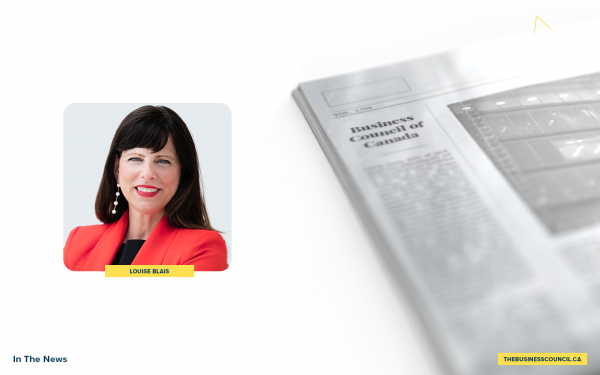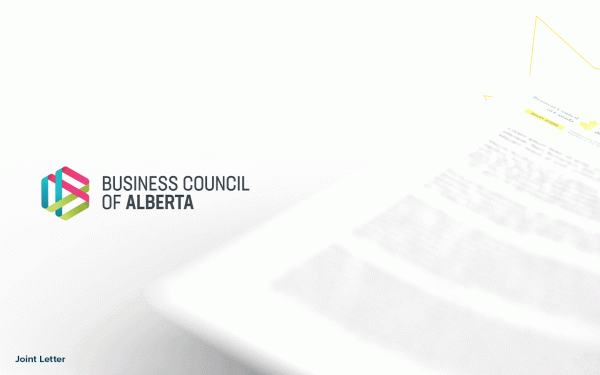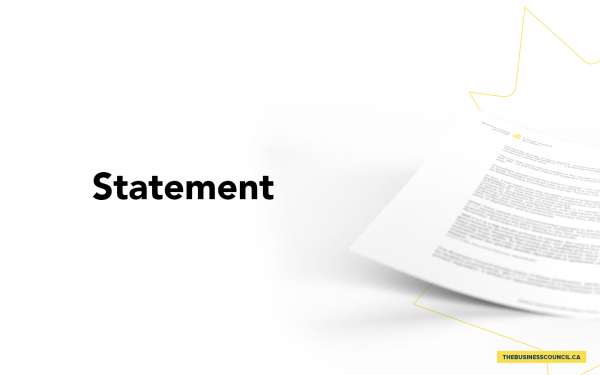Preparing for Canada’s energy future – François Poirier, TC Energy
François Poirier and his co-workers see themselves as problem-solvers.
The problems are many, and familiar to anyone who follows North America’s energy industry.
- The need to reduce emissions from traditional energy sources like oil and natural gas.
- The need to transition to lower-carbon sources without raising prices for consumers.
- The need for energy security in a world that is increasingly unpredictable.
It’s a tall order, but Poirier – President and CEO of Calgary-based TC Energy – is optimistic that his company and others in the industry can meet the challenge. Not only that, he’s convinced that Canada can play an outsized role in solving the world’s energy problems.
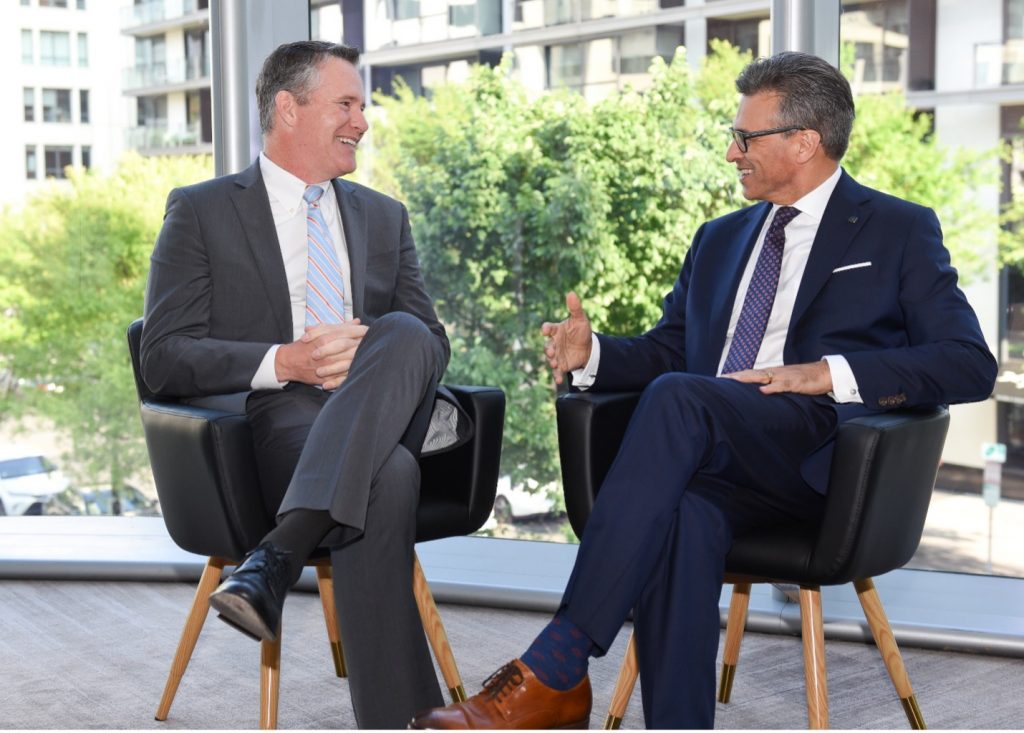
In a conversation with Goldy Hyder in the Speaking of Business podcast, Poirier points to Canada’s natural resources, private sector leadership and energy expertise as key ingredients that can help countries around the world lower greenhouse gas emissions.
In addition, Poirier says Canada’s energy sector has a lot to contribute to a coordinated North American energy strategy. “It’s through collaboration, cooperation, and commerce that North America can underpin the security and the prosperity of billions of people,” he says.
In a wide-ranging conversation, Poirier also explains why mental wellness is a priority at TC Energy, why he enjoys competing in triathlons, and what career advice he’s shared with his two sons.
Subscribe
You can find Speaking of Business wherever you get your podcasts.
Latest Podcasts
Transcript
Goldy Hyder:
Welcome to Speaking of Business, conversations with Canadian innovators, entrepreneurs and business leaders.
I’m Goldy Hyder, President and CEO of the Business Council of Canada. One of the greatest challenges we face as a country is climate change. It’s going to take a lot of innovation, creativity, and problem solving to navigate the energy transition and chart a path to a net-zero future. So what is it about that challenge that convinced Francois Poirier to leave 25 years in the banking industry to take it all on as President and CEO of TC Energy, Francois leads a team of self-described and I quote “Energy problem solvers.” What does that mean though in practice and what motivated Franco to embrace these challenges? Let’s find out. Welcome to the podcast, Francois.
François Poirier:
Thanks Goldy. I’m pleased to be here.
Goldy Hyder:
Well, look, let’s start with what I just said. The world is like a complicated place and it’s got lots of problems. How do you go about solving problems at TC Energy that makes you all problem solvers and is there something there for business to help contribute to solving problems in the world?
François Poirier:
Goldy, I think it starts with what your outlook is around the opportunity set, and I come to this with a huge amount of optimism. I think the opportunity for Canada to punch above its weight in helping solve the world’s energy problems creates just a huge opportunity for us. We generate under 2% of the world emissions and yet I believe through our natural resources, through our expertise and through our leadership, we can help the world lower its emissions by multiples of that, and it’s just a question of finding the right motivations and the right collaboration between different stakeholders in the economy.
Goldy Hyder:
Let’s break that down a bit here because I want to try and find a parallel between how business goes about solving problems and obviously businesses don’t go door to door to get elected, but what lessons can be learned from how you go about it? It sounds like obviously an attitude, optimism, get it done, the belief that you can get it done. The idea that we can lead, all of these are elements. How does that translate into how do we help solve some of the world’s problems that we clearly need to get to?
François Poirier:
I think what we need to do, Goldy, is always try and put ourselves in the shoes of who we’re engaging with, be they policy makers, be they customers, or even our employees. Helping see the world through their lens and making their agenda our agenda is the way to solve problems, contextualizing challenges that our customers are trying to undertake to be competitive for example. They don’t live in the energy world day to day. They may be a steel manufacturer or a poultry company. They have a policy however, that they want to reduce their carbon footprint. How do they do that when they’re not steeped in the world of energy as we are? So we really start with helping understand what our customer’s problems are and then we are solution agnostic. We don’t approach those conversations with the solution in mind before we actually understand what the policymakers objectives are or the customer’s objectives are. You start with that and then you work your way backwards and you figure out what kind of collaboration is required and what role does each party need to play to solve a problem.
Goldy Hyder:
You mentioned the customer and the consumer. We saw in Europe sometimes what happens when you get too far ahead of your customer and your consumer. There’s a recent survey I shared with you by Ipsos-Reid talking about just how little Canadians actually know about what this means for them, and I’m wondering what can you do as a business? What can you do in your industry to help educate and communicate with Canadians that this is not a free ride?
François Poirier:
That’s a really interesting question and it’s hard to predict what ultimately the cost of energy transition will be. What I can tell you is that economies do have to spend literally trillions of dollars to help achieve those goals. I think approaching it from the perspective of energy addition versus energy suppression is the way to go. You talked about what’s been going on in Europe, closing down nuclear plants ahead of the end of their use of lives, closing down coal plants early, not encouraging domestic natural gas production and investing heavily in renewables that are an important part of the value chain but aren’t always reliable. The wind doesn’t always blow and the sun doesn’t always shine. We’re going to have 2 billion more people on the planet in 30 years. We already have 1.7 billion people on the planet who don’t have access to affordable and reliable energy. So from my perspective, our job is to make every source of energy as sustainable as possible without compromising affordability or reliability, and that means lowering the emissions profile of natural gas and crude oil, as well as encouraging investment in renewables as well as other forms of energy supply in the future.
Goldy Hyder:
You’ve got kids, right?
François Poirier:
I do.
Goldy Hyder:
Are they proud of what their dad does and the industry he works in?
François Poirier:
They are. They understand my teachings to them are the same teachings my father gave to me. First and foremost, this was one of my father’s favorite sayings to me was, “A clear conscience is the softest pillow.”
Goldy Hyder:
Sounds something similar to my dad said, which is, “A man will do anything to get good sleep.” Keep your conscience clean.
François Poirier:
Exactly. And so they know that this is a commandment of mine, if you will. It’s really the basis for all of my behaviors is always to try and do the right thing and act with integrity, and they see that while the outside world, the universities they attended, some of the media and other conversations they see happening around them is challenging our industry. Fundamentally, they know that their father will always do the right thing and they believe in what we’re trying to accomplish.
Goldy Hyder:
The key to the transition, of course, is going to be innovation and innovation is going to require both capital, and the regulatory environment, which for that capital to form and frankly a lot of innovation to happen, which means people, how well positioned are we in Canada for that?
François Poirier:
We have a very talented workforce in Canada. I lived and worked in the United States for 10 years in the middle part of my career and I would stack up professional Canadians against any talent anywhere in the world. I would like to see more of our talent stay in Canada and create value for Canadians. In order to do that, we have to create incentive or opportunity for them to stay in Canada. I think having a diverse workforce is critical to innovation and that means attracting people with diverse socioeconomic backgrounds, gender, even experience-based opinions and skills is what’s going to help us be more innovative. But what the workforce needs to see Goldy, is that governments, businesses, indigenous communities, and any other stakeholder are collaborating. That we have a strategic outcome in mind that’s well-defined and that we have a clear understanding of what needs to be accomplished by when, and what each of our roles is in accomplishing that outcome. That is something I think we need to see more of from leaders in the business community and policy makers in Canada so that when talented Canadians are looking at their prospects and their options in Canada versus elsewhere, they see the benefits and opportunities of remaining here.
Goldy Hyder:
You talked about collaboration and I wanted to ask you about TC Energy’s efforts in the indigenous communities. Some will say that any projects DOA without them at the beginning, the middle and the end, and now of course we’re seeing a lot of equity opportunities for indigenous communities. What are you doing specifically to help indigenous reconciliation in this country?
François Poirier:
For us, Goldy, it’s about knowing what each individual indigenous group or community has as goals. Again, what I talked about before, putting yourselves in the shoes of the entity or the people you’re engaging with. For that reason, we established an indigenous advisory council at TC Energy. We were among the first Canadian companies and I believe we were the first energy infrastructure company in North America to publish a corporate reconciliation action plan and we’ve formed a committee of Canadian predominantly indigenous leaders to help us in our journey of reconciliation. One of the things that’s come from the process of that dialogue is our recognition that equity ownership changes everything. We’ve arranged for an option for all 20 indigenous communities along the Coastal Gaslink route to have the option to acquire equity in our project at completion. We are developing a number of other critical infrastructure projects across the country and in virtually every circumstance we’ve engaged with one or more indigenous communities and very much want to see them be partners and peers of ours at the table making sure the infrastructure is developed responsibly.
Goldy Hyder:
Let’s go back a little bit to sort of the company in and of itself. It’s very North American in its footprint and you and I have talked about that you don’t need much more. This is the customer in the market base is very strong here. Just give our listeners a sense of sort of where TC’s operations are.
François Poirier:
TC Energy is a North American company. We have a significant presence in all three countries, Canada, the US and Mexico. We transport over 25% of the natural gas around the continent. We transport 20% or so of the crude oil to export markets, primarily the US Midwest and the US Gulf Coast. And we also have a large and vibrant power business, and this is something that not many people are aware of. We own just under half of the largest operating nuclear plant in the world at Bruce Power with nearly 7,000 megawatts of emission-free power that’s generated.
We have four pillars in our power and energy solutions business. The first is our nuclear business. The second is what I call firming resources. Essentially helping make renewable projects more reliable by building very large batteries. They can be lithium ion batteries, they can be pumped hydro storage, but that is that second pillar. The third pillar is building out more wind and solar to help reduce the carbon footprint of the North American economy. And the fourth are what I call new energies. We’re developing renewable natural gas production. We’re developing carbon capture and storage to help reduce the carbon footprint of oil and gas production. We’re developing hydrogen production hubs, all of these new energies that need to be added to the existing mix to meet the energy needs of tomorrow in as low a carbon footprint as possible.
Goldy Hyder:
The second question I guess related to your company is that as you are very North American to what you said, there has been a push to make an attitudinal shift, if you will, to think of us as Team North America as opposed to Team America. You and I were together in Mexico for the what’s called the Three Amigo Summit unofficially, but officially the North American Leaders Summit. What are the opportunities for this region?
François Poirier:
It’s very clear to me, Goldy, that Canada, Mexico, and the United States will all be stronger by creating a strong North America. Not only for the sake of North America, but for the sake of the world. Within the context of energy, for example, we have an abundant source of natural gas that can meet growing global demand for energy and help accelerate energy transition. Liquified natural gas can displace coal and oil that’s used for power generation and dramatically improve the world’s track record in reducing emissions. One of the reasons the United States has seen the largest reduction of emissions over the last several years is because of its ability to convert its power generation from coal to natural gas. So we see a great opportunity there and we need to find new ways to move energy resources across our three countries to develop mutually beneficial partnerships. And it’s through collaboration, cooperation, and commerce that North America can underpin the security and the prosperity of billions of people.
Goldy Hyder:
Let’s conclude this sort of focus on the company and it’s role in North America, but I want to come back to you and I are very proud Canadians. We’ve talked a lot about the ambition for this country. How optimistic are you about Canada a decade from now? Where do you see us?
François Poirier:
Canada? As I said before Goldy, has an opportunity to punch above its weight in world energy markets. We have talent in this country that’s every bit as good as anywhere in the world. I would love to see it stay in Canada and create value for all Canadians. And for that to happen, business governments and other stakeholders need to be far more collaborative and strategic in mapping out what success looks like. Frankly, this is something I see the US being extremely good at. When we look at the LNG opportunity that came to North America 10 or 15 years ago, and you look at the outcome of today, the United States is the largest exporter of LNG in the world from a standing start, 10 or 15 years ago. And
Goldy Hyder:
I think 22 was record, right? 22, they did record oil and gas exports.
François Poirier:
Exactly. And we had the same opportunity in Canada. And what I saw, because we’re a North American company, we have as large a presence in the US as we do in Canada, is I saw businesses and government in the US collaborate with a strategic goal in mind, which was for the US to establish energy independence and for the US to be a dominant player in world energy markets. And we need to see that in Canada. The opportunity is there for us to grasp.
Goldy Hyder:
The audience here is often comprised of young aspiring leaders, young aspiring CEOs, and I know in the 75 or so podcasts we’ve done, certain themes start to emerge and one of those themes as leaders seem to be suckers for punishment, you participate in triathlons. What drew you to that?
François Poirier:
Well, first of all, I’m not any good at it. Just set the record straight. I love the discipline of learning new things. Triathlon is swimming, then biking, then running and learning the discipline of new skills. I was a runner first and I had to learn how to cycle and then how to swim, which was interesting. The process of learning has always fascinated me. The second thing I’d say is I get a huge mental health benefit from this activity. I believe that physical health can contribute to mental health and it really does help me manage what can at times be a very stressful job. The other thing I would say, Goldy is I must be a glutton for punishment. I prefer the longer distances, so the half Iron Man distances and the full Iron Man distances anywhere from 6 hours to 15 hours for the longer distances because I like the mental challenge it brings. I like having to overcome adversity and learn to put one foot in front of the other to make progress.
Goldy Hyder:
You also talked about the benefits of exercise being not just for physical health but for mental health. How would you find that doing triathlons has helped benefit your mental health? And then I want to ask you more broadly, how do you encourage this kind of an environment of mental wellness at TC Energy as a leader?
François Poirier:
It’s something as you know Goldy, some of our Business Council of Canada colleagues shared with us around mental wellness being an increasingly important criteria in individuals entering the workforce and choosing where they go to work. So we have really leaned in at TC Energy on the importance of mental wellness. It’s about making people feel like it’s okay to talk about mental health, and it’s okay not to be okay. So what we’ve done is we’ve established what we call a mental health champions network. Groups of trained advocates who have undergone some mental health challenges themselves, that work to create a safe space to support people to talk about it. We’ve created a mental health training program that all leaders, employees of the company are required to take to increase their knowledge of mental health and how to support their team members who are going through some struggles. And then thirdly, just helping people make the connections to understand what mental health resources are available to them to help deal with issues and letting the experts do their work.
Goldy Hyder:
I think people will… Well, they shouldn’t be surprised, but any conversations I’ve had with CEOs, particularly during COVID and just shortly thereafter, mental health was probably number one or two on the list of what’s keeping you up at night. And it was the concern for their employees. And now the need to try and find that recreate the culture of returning to work was almost always the response was not just about work because I care about my employees and their wellbeing. So well look, thank you for your leadership on that. Another area that we found of interest on the TC Energy website is some videos of employees delivering a message to their younger selves. So you knew I would be asking you this question, but what message would you deliver to your younger self?
François Poirier:
That’s a very interesting question and I’ve had this question from my two sons. They’re 28 and 26, so they entered the workforce in the last five or six years. The first thing I tell them is, as I mentioned before, always do the right thing. Living with integrity and abiding by your values is always the way to conduct yourself.
The second thing I’ve shared with them Goldy is, learn to fail and have a failure as early as possible in your career. Because what you will realize is that there’s no such thing as failure. There’s only success and learning, and that not achieving success is not the end of the earth. And that makes you more comfortable in taking risk in the future. If you’ve overcome not achieving success and you’ve seen that you actually benefit from the learnings, you will be more open to taking risk in the future. And it’s by taking risk that you steepen your learning curve and you develop faster.
Goldy Hyder:
So I have to ask, because I think we all have these, do you remember an early failure, however insignificant it might have been that kind of made you go, well, I can’t let that happen again?
François Poirier:
Yes, I do. And we talked a little bit earlier about the importance of putting yourself in the shoes of the person you’re engaging with, make their agenda, your agenda. Early in my career, I was given by my leader at JP Morgan, the Canadian Power Pipelines and Utilities sector to cover. It’s a sector we had never covered before. And I went about developing relationships and my first few meetings were about me bringing product, bringing things I wanted to talk about to the table and not really focusing on what it is my customer wants to focus on. And it became very clear to me early on that putting yourself in the shoes of the individual with whom you’re engaging will result in a much more successful conversation.
Goldy Hyder:
Know your customer, I think I’ve heard that one before. My father always says, “Customer is king.” Right? Or queen. All right, well look, some of this sets up. You mentioned career. You made a very significant career switch. You just referenced JP Morgan where you’ve been in financial services for a very long time before joining TC Energy in 2014 on and about the time that we actually met. And I’m wondering what did you know, a risk averse business like banking? Please don’t tell any of our COs that I said that, but I mean it’s a pretty safe industry compared to others. And you go to energy in Alberta, in Canada, and leading a project that ultimately didn’t make it through Quebec. Wow. What prompted you to do that?
François Poirier:
The vast majority of my banking career was focused on advising companies in the energy infrastructure space. And so I had the privilege over the course of that 25 year period to work with a couple of dozen of the largest energy infrastructure companies in the world. I saw how they approached strategy. I saw how they approached capital allocation, talent management, risk management. It’s definitely influenced my own leadership style in that I’ve picked some of the attributes from many of those companies. But it also attracted me to experience what it’s like to live as a principal as opposed to an advisor. Living with your decisions was a challenge and a curiosity I had that was too good to pass up when the opportunity came up for me to move over to TC Energy.
Goldy Hyder:
Now, how are you for free time in your life? Do you have time to read books and things? I think you’re an avid reader, if I recall.
François Poirier:
I am. I read about a book a week.
Goldy Hyder:
What are you reading this week?
François Poirier:
I’m actually finishing a book called The Outsiders. It’s the author is a gentleman by the name of Bill Thorndike. The full title is The Outsiders Eight Unconventional CEOs, and Their Radically Rational Blueprint for Success. And fundamentally, it’s about how those leaders all took different approaches to making business decisions. But the common thread is that capital allocation should be a CEO led initiative. And at the end of the day, we should always abide by fundamentals and not what’s fashionable. And you have to have the courage to be a contrarian if you believe that what’s fashionable is not supported by fundamentals.
Goldy Hyder:
Now, you’re a first time CEO technically. I mean you’ve brand divisions and so forth as you said, but what surprised you? What is it that you learned when you became a CEO? Like, wow, I didn’t know this.
François Poirier:
It’s interesting, Goldy. It’s one thing to hear something and then it’s another to internalize it. So I would say that I heard the two following things. First, make sure you’ve got the right team around you as soon as possible that in fact, many CEOs, two or three years after taking on the role are interviewed, and one of the common observations they make is I should have made some people changes more quickly than I did. That is certainly borne out to be true in that I’ve internalized the importance of having a strong team around me, and I believe we do at TC Energy.
The second is, managing stakeholders, employees, policy makers, shareholders, your board takes up a lot more time than I would have estimated before I took on the role. It’s perhaps the nature of our industry. It’s very influenced by policy. There’s a lot of media interest in our industry. There’s a lot of volatility in the industry with respect to energy transition policy, lots of disruption. But I would say the amount of time I devote to external engagement is higher than I thought it would be.
Goldy Hyder:
Well, let’s wrap up there with this question because you and I worked on a project together, as I mentioned, Energy East and we’ve got the scars to prove it. What you just said really is a reflection of where we are as a society globally, right? I mean, the advent of the internet, the social engagement that takes place has changed the role of a CEO to lead a company, manage a company, be accountable to shareholders, and its in work with its board and its team Seals are expected to do more in society. They’re expected to go beyond their companies. And you stepped into that when you were at Energy East and now you’re running the whole show. Do you think that’s really the change that seals are experiencing now that their expectations of society is we want more leadership from our business leaders?
François Poirier:
I do. It’s this question of purpose. What’s the purpose of a corporation? Does it have a fiduciary duty only to its shareholders or does it have a duty to a broader set of stakeholders? And I think expectations of stakeholders have evolved and changed, and I would say heightened. And through the advent of social media, the various geopolitical challenges that we see occurring around the world in energy systems, which is what we live in the volatility of our external environment has never been higher. But also, I would say as an energy infrastructure company, Goldy, this is the greatest time in the history of energy infrastructure. Governments have to spend trillions of dollars to decarbonize their energy systems, and energy infrastructure companies will be presented with opportunities that exceed their human and financial capital resources. Our job is to make good choices about how to allocate that human and financial capital. And you can’t do that unless you have a really firm grasp on your external environment and frankly have an ability to influence it in a positive way to make sure that your company can prosper.
Goldy Hyder:
And if not Canada, who?
François Poirier:
I would say North America.
Goldy Hyder:
Led by Canada.
François Poirier:
Led by Canada. I am a proud Canadian. I lived many years, lived and worked many years in the US. I view myself as a North American, and I really do believe, particularly in energy, where energy flows, ignore borders, that Canada is stronger within a coordinated North America, as would the United States and Mexico. And so if it’s not Canada, I think it’s North America. And I do believe that Canada can play a leadership role in punch way above its weight.
Goldy Hyder:
Well, look, my friend, thank you for the leadership role that you’re playing and you’re punching above your weight. We appreciate you joining us here today, and I’m sure it’s the first of other conversations we’ll continue to have.
François Poirier:
My pleasure, Goldy. Enjoyed it very much.
Goldy Hyder:
Francois Poirier is the president and CEO of TC Energy. If you would like to hear more of our speaking of business conversations with innovators, leaders, and entrepreneurs, why not subscribe to our podcast, search for Speaking of Business, wherever you get your podcasts, or simply go to our website at thebusinesscouncil.ca. That’s, thebusinesscouncil.ca. Until next time, I’m Goldy Hyder. Thanks for joining us.

